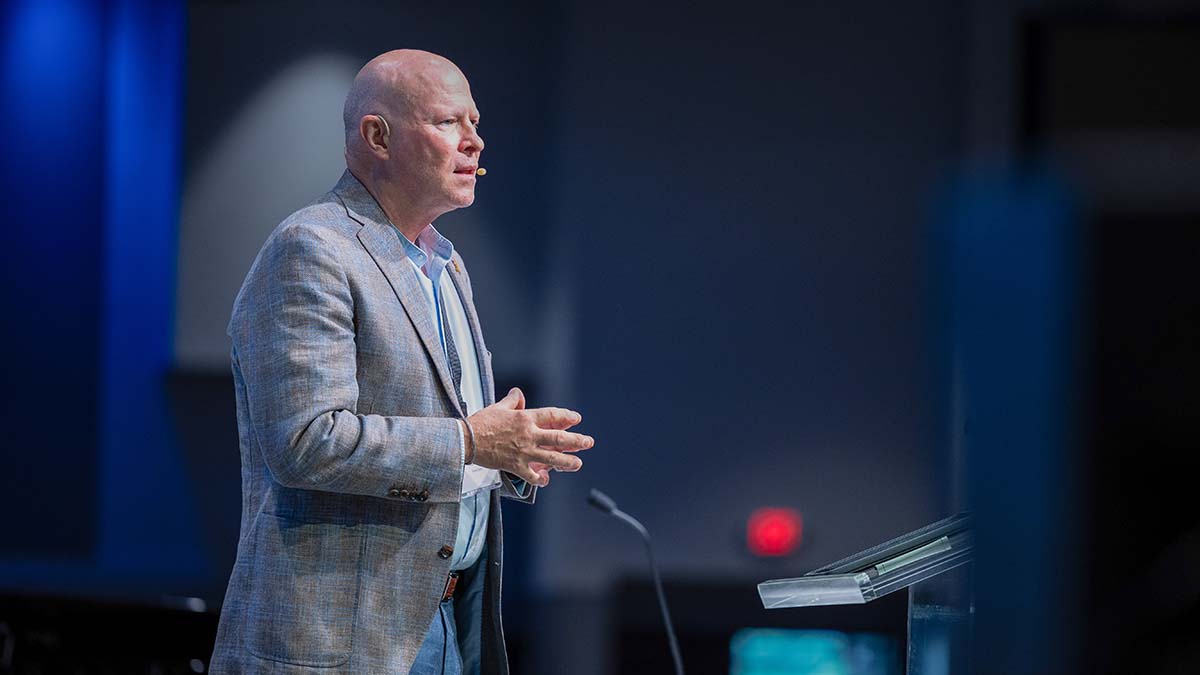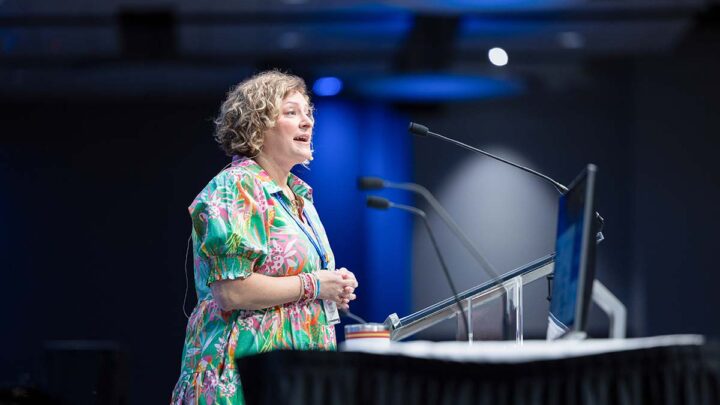Friday afternoon began with our session on Peace Building. Bishop Shelton stated that “peace building is an expression of our discipleship.” It includes creating wholeness and righting wrongs.
Teachings on Peace Building
Rev. Molly White, associate pastor at Hayes Barton UMC, brought the teaching segment of the session. She shared her story and preached on the sermon on the mount. White’s story includes being a pastor of spiritual formation, serving and chairing the Board of Church and Society, being a mother of two children, and being a widow and a homicide survivor. She shared how her husband, Patrick, was shot and killed while at work in his law office. He modeled the love of Christ by laying down his life for his colleagues. White narrated her experience of learning of Patrick’s death, having to share that news with her family, the long road of surviving homicide, and how her heart has been broken open.
White framed her presentation around words from Mary Oliver’s poem, “Lead,”
“I tell you this
to break your heart,
by which I mean only
that it break open and never close again
to the rest of the world.”
White said that “heartbreak is the beginning of peace-building.” We don’t need peace unless something is broken. White explained that “being a homicide survivor made me a peace-builder, but it didn’t have to be that way. It’s a choice.” She chose to remain part of the world instead of retreating from it.
Suffering this trauma led White to dive into the topic of evil. She clarifies that the action the shooter took was evil. The man was not evil. Though she was angry, she worked to transform it into righteous anger that the children of God let evil win. She declares, “We become peace-builders because we don’t want evil to do this to anybody else. Peace-builders don’t let evil win.”
Referencing the United Methodist Baptismal Covenant, White points out that it is the work of the baptized to resist evil. We renounce that we are giving up evil. We must speak love and truth to the powerful to reject their evil. We repent of our failure to be genuinely human. We do more than just think about resisting evil – we build relationships, listen to stories, and embrace peace.
Reading Matthew 5:1-12 from the sermon on the mount, White notes how these blessings are for the brokenhearted and that Jesus is in solidarity with those who suffer. As Jesus suffered on the cross because of evil, we, too, have suffered because of evil. Imagine sitting at the foot of the cross – it breaks our hearts. Every person has been hurt and is loved by God. We live with broken open hearts, and our love can pour freely like the love of Jesus.
White proclaimed, “Disciples are peace-builders: The Witness of the Church.” She said, “When you’ve been wounded and survive, you can do hard things.” The next two speakers shared the hard things they have been doing in the work of peace-building.

Rev. Dr. Joey Shelton shared examples of how anti-racism work is the work of peace-building. Referencing the sermon on the mount, Shelton noted how the blessing for the peacemakers comes right after the blessing of the “pure in heart.” Hearts broken open allow room for purity, but pure hearts and peacebuilding have an evil cousin: persecution. Shelton then proceeded to tell his own “deep story” of being a “recovering racist.” He gave examples of how participation in anti-racism work is peace-building and that as Christians we are called to that work.
White spoke after Shelton on how gun violence prevention is peace-building. She gave statistics from the Gun Violence Archive along with statistics showing that the majority of Americans favor common sense gun laws. The Bishop’s Gun Violence Prevention Task Force provided free gun locks after the session and information about how to obtain more gun locks for free.
Next, Rev. Seyun Hwang spoke about the English as a Second Language (ESL) literacy initiative at Genesis UMC where he is the associate pastor. He explained that illiteracy hinders our efforts to build peace and prevents people from making informed decisions. Tackling illiteracy is peace-building. The goal of the ESL program at Genesis UMC is transformation for peace and justice, not assimilation. The program has included 44 students, 12 language backgrounds, and 15 volunteers, including six volunteers that were not church members. Of these participants, some started attending Genesis — including one that will be baptized soon — even though the curriculum is not religious. The program has only cost the church $1,319.41 over three months, showing how we are not hindered in peace-building because we don’t have enough resources, whether they be financial or other restrictions. We are hindered by illiteracy, but programs like this one can build bridges for the transformation of the world.
White returned to the podium to conclude this teaching session. She quoted Louise Glück, “At the end of my suffering there was a door.” White reminded us that, “when you open your heart and resist evil, you are following Jesus.”
Peace Building in Connectional Ministries
The Peace Building session continued with a Connectional Ministries video introduced by Rev. Jaye White. The video highlighted the work of Creation Care Ministries, the Refugee & Immigration Committee, and Living the Word. Living the Word is a yearlong process that helps churches discern how to do outreach ministry by addressing inequities in their local context. Rev. Ismael Ruiz-Millán, the incoming Executive Director of Connectional Ministries, followed the video by challenging the church, “Peace-building will not only be words we say but a call to actively transform our world.”
Rev. Jaye White and Bishop Connie Shelton led the Conference in blessing and sending two Global Mission Fellows, Kristina De Jesus and Mia Salvaggio.
Methodist Home for Children Update
Rev. Bruce Stanley brought a report from Methodist Home for Children (MHC). Part of their work is representing peace to juvenile offenders. MHC is the largest provider in North Carolina for therapeutic alternatives for court-involved children. They also offer educational projects at their residential facilities that build the foundations for children to thrive. It is long work that they do in the business of building peace especially for those who feel peace is unattainable.

